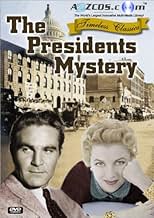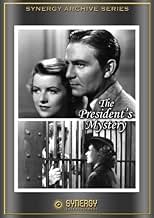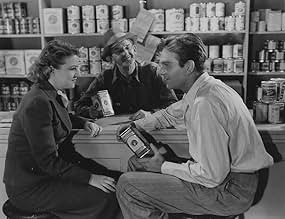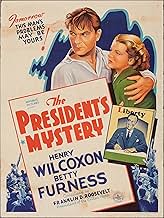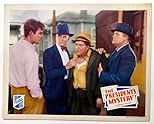Aggiungi una trama nella tua linguaA millionaire with a crumbling personal life comes up with an idea on how he can disappear, start a new life without anyone knowing who he is and be able to take all his money with him.A millionaire with a crumbling personal life comes up with an idea on how he can disappear, start a new life without anyone knowing who he is and be able to take all his money with him.A millionaire with a crumbling personal life comes up with an idea on how he can disappear, start a new life without anyone knowing who he is and be able to take all his money with him.
- Regia
- Sceneggiatura
- Star
- Charlotte Brown
- (as Betty Furness - courtesy MGM)
- Sergeant
- (as Robert E. Homans)
- Undetermined Supporting Role
- (partecipazione non confermata)
- Townsman
- (non citato nei titoli originali)
- Bus Passenger
- (non citato nei titoli originali)
- Townsman
- (non citato nei titoli originali)
- Banker
- (non citato nei titoli originali)
Recensioni in evidenza
The film's protagonist is a millionaire who has made some bad decisions in life, leading him to decide to just disappear and reappear elsewhere with a new, assumed identity. Intrigue proceeds to follow him. There's some mystery and comedy but the film never really succeeds in either genre, instead coming across as bland and instantly forgettable.
So Wilcoxon turns his assets into cash and disappears. Brent is accidentally killed by Blackmer's chauffeur, who covers it up with an accident. Soon enough, the conclusion is that Wilcoxon went bust, killed his wife and committed suicide; in reality, he's helped to reopen the Furness' cannery as a cooperative. They're about to ship out the first batch, when Blackmer shows up in town put the squeeze on.
It's a good set-up for the situation, which was proposed by Franklin Delano Roosevelt in an interview; he was known to be a mystery fan. He asked if a man could disappear with $5,000,000 with liquid assets. There's a scene with Wilcoxon reading the result in a slick magazine. the first half is an interesting piece of work, with some strong acting by all hands; the second half turns into a more standard work of New Deal fiction, the type of thing best left to Frank Capra.
James Blake (Henry Wilcoxon) is a mega-millionaire who has little to do with himself as he's loaded with money and his holding run themselves. One day, he goes on a fishing trip and discovers a small town in trouble...in trouble thanks to industrialists like himself. So, he decides to pretend to be just a regular Joe and moves to the town in order to re-start its dead canning industry.
Unfortunately for Blake, his less than loving wife has been accidentally killed...and folks think HE is responsible. This means that remaining in disguise might be a good idea...though he doesn't have access to his immense fortune.
The film comes off like a Depression era fairy tale--with some stereotypes and obvious messages are inserted liberally. I think had the story been less heavy-handed and more believable, it could have worked, as one of the best films of the 1930s was "The Millionaire"...a film from 1931 starring the wonderful George Arliss. It's also about a man who is essentially like Blake--who goes back to work and gets his hands dirty because being a millionaire is so dull and non- productive.
The Roosevelt connection is interesting, especially if one has read about the President's struggles and personal life around this time. It makes one wonder if anybody in 1936 thought it was strange that a sitting President would be mulling over ideas about middle-aged rich men disappearing and setting up new lives to get away from their problems. Beyond that, I think it's a good B movie with an intriguing premise. The performances are all solid and the direction is creative here and there. It creaks and groans at times, no doubt a mix of its Poverty Row pedigree and the quality of available prints today. It's worth a look but probably more so for the historical elements than because it's particularly entertaining as a mystery film.
Lo sapevi?
- QuizThis is the only film where a sitting President of the United States has been credited as a writer.
- BlooperBlake's dog accompanies him on the fishing trip, then doesn't appear when he goes into the meeting hall or any time after that.
- Citazioni
Opening Titles: Forward. President Franklin D. Roosevelt, talking with a magazine editor on one of his favorite subjects ~ mystery stories ~ advanced the question: "How can a man disappear with five million dollars of his own money in negotiable form and not be traced?" Challenged by this, the editor enlisted the aid of six famous authors. The result was a thrilling story. The same problem intrigued the producers of this photoplay, and in another form is now brought to the screen. The proceeds of the sale of the plot, both for publication and motion picture rights, have been given voluntarily by the publisher to the Georgia Warm Springs Foundation.
- Curiosità sui creditiPresident Franklin D. Roosevelt, talking with a magazine editor on one of his favorite subjects--mystery stories--advanced the question: "How can a man disappear with five million dollars of his own money in negotiable form and not be traced?" Challenged by this, the editor enlisted the aid of six famous authors. The result was a thrilling story. The same problem intrigued the producers of this photoplay, and in another form is now brought to the screen. The proceeds of the sale of the plot, both for publication and motion picture rights, have been given voluntarily by the publisher to the Georgia Warm Springs Foundation.
- ConnessioniFeatured in Red Hollywood (1996)
I più visti
Dettagli
- Tempo di esecuzione
- 1h 20min(80 min)
- Colore
- Proporzioni
- 1.37 : 1

